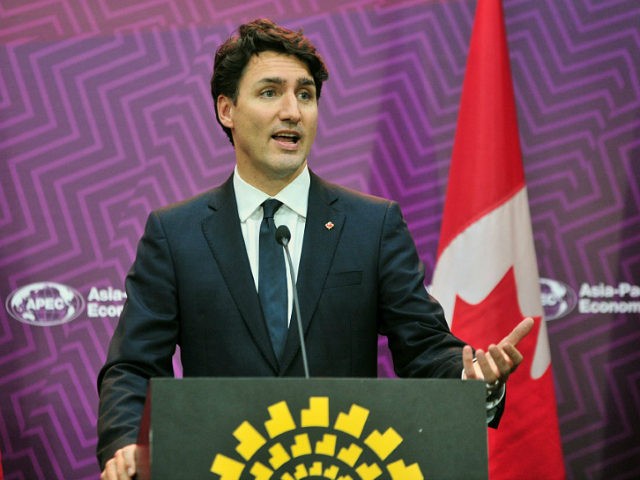Canada’s Globe and Mail has revealed that leftist Prime Minister Justin Trudeau attended a fundraiser at a Chinese-Canadian millionaire’s mansion shortly before businessman Zhang Bin donated one million Canadian dollars to the Pierre Elliott Trudeau Foundation.
Justin Trudeau’s presence at the fundraiser has revived concerns that Trudeau is open to conducting business with nations that serially violate human rights following the Prime Minister’s return from Cuba, where his father’s longtime friendship with dictator Fidel Castro was at the forefront of coverage of the visit.
The Globe and Mail reports that Trudeau attended a Liberal Party fundraiser at the home of Benson Wong “weeks” before Zhang donated to the foundation carrying his father’s name, as well as donating to the University of Montreal Faculty of Law. Zhang also attended the event, entry to which the newspaper reports cost $1,500 a piece. Zhang’s potential involvement with Trudeau is a concern because, the newspaper argues, “Mr. Zhang is a political adviser to the Chinese government in Beijing and a senior apparatchik in the network of Chinese state promotional activities around the world.”
The Globe and Mail describe the fundraiser as a “cash-for-access,” or pay-to-play, event.
Trudeau responded to the revelation by claiming that his fraternizing with Communist Party apparatchiks was necessary to bring jobs to Canada. “Canadians faced a period of 10 years of lower-than-needed growth under the previous government. That is why we have committed,” he claimed, “to engaging positively with the world to draw in investment… drawing in global investment is a great way to grow the economy and create jobs.”
Trudeau’s willingness to “engage positively” with the Chinese Communist Party sheds some light on his decision to downplay the nation’s serial human rights abuses during his visit there in September. While supporters praised him for being “tough” on human rights, Trudeau did no such thing, instead telling his Chinese audience that Canada is not better at respecting international human rights norms than China.
“(I) talked about the challenges, but also talked about the fact that Canada is not immune to criticisms on human rights, either,” Trudeau said in Hong Kong, describing his meetings with high-level officials. “The perspective that a lot of countries have is, ‘Well, you know, foreign countries or foreign observers shouldn’t be criticizing what are internal matters to us.”‘
This month, Trudeau behaved similarly in Cuba, a nation in which routine beatings, threats, and torture of political dissidents, particularly women, is common. In addressing dictator Raúl Castro, Trudeau instead turned his rhetoric against American President-elect Donald Trump, assuring Castro that Trump’s pro-human rights stance would not “change the strong relationship” between Trudeau and “my friend” Castro.
Trudeau’s embrace of regimes that systematically violate the human rights of women stands in stark contrast to his words. Trudeau repeatedly refers to himself as a “feminist,” vowing to “keep saying loud and clear that I am a feminist until it is met with a shrug.” Yet he maintains strong ties with Havana and Beijing, a regime that still forces women to undergo abortions as a form of population control, and has continued to sell weapons to Saudi Arabia, one of the most anti-women regimes in the world. Trudeau’s government has approved a $15 billion arms deal with the Mideast kingdom, triggering harsh protests from far-left commentators who feel Trudeau is not a good representative of the ideology he claims as a head of state.
In response to criticism, Trudeau protested that the Saudi arms deal must go forward because “we’re not a banana republic,” using a racially-tinged slur typically reserved for tropical, illiberal nations.

COMMENTS
Please let us know if you're having issues with commenting.